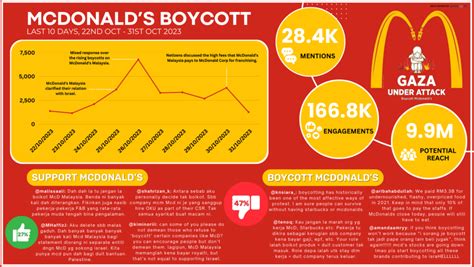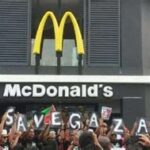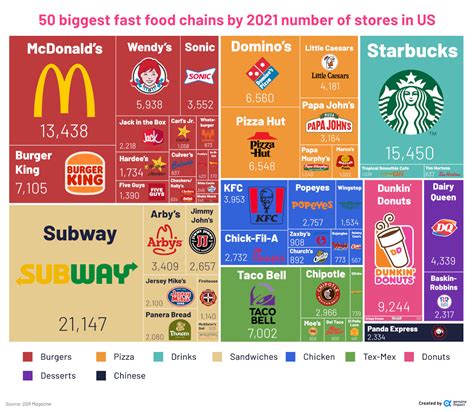
McDonald’s has issued a formal statement addressing the impact of ongoing boycotts linked to the corporation’s perceived stance on the Israeli-Palestinian conflict, detailing measures aimed at mitigating financial repercussions and reaffirming its neutrality in the politically charged situation. The statement emphasizes the company’s commitment to local markets and its independent owner-operator model, highlighting that actions and statements made by individual franchisees do not reflect the global brand’s official position.
McDonald’s Responds to Boycott Amidst Geopolitical Tensions
McDonald’s Corporation has publicly addressed the significant impact of boycotts affecting its operations across several regions, stemming from perceptions regarding the company’s alignment in the ongoing Israeli-Palestinian conflict. The fast-food giant issued a formal statement acknowledging the business challenges and outlining steps to reaffirm its brand neutrality and commitment to local markets.
The boycotts initially gained traction after a McDonald’s franchisee in Israel reportedly offered discounts to Israeli soldiers, a move that sparked outrage and calls for boycotts across the Arab world and among pro-Palestinian activists globally. This localized action was interpreted by many as an endorsement of the Israeli government’s policies, triggering a wave of consumer activism targeting McDonald’s franchises in various countries.
In its official response, McDonald’s emphasized its corporate structure, highlighting that the vast majority of its restaurants are owned and operated by independent franchisees. This decentralized model, the company argued, means that individual franchisees make operational decisions specific to their local markets, and these decisions do not necessarily represent the views or policies of the global McDonald’s brand.
“We are aware of the impact that the current conflict in the Middle East is having on businesses like ours,” McDonald’s stated. “McDonald’s Corporation does not support any government or political agenda. Our priority is to ensure the safety and well-being of our employees and to serve our customers in the communities where we operate.”
The company further clarified that financial support or actions taken by individual franchisees should not be construed as an endorsement of any particular political stance. McDonald’s reaffirmed its commitment to serving all customers regardless of their background or beliefs.
The boycott’s impact has been particularly pronounced in Muslim-majority countries, including Malaysia, Indonesia, and Egypt, where McDonald’s restaurants have experienced a significant decline in sales and customer traffic. Social media campaigns advocating for the boycott have been widespread, amplifying the call to protest against McDonald’s and other Western brands perceived to be supportive of Israel.
McDonald’s response seeks to address these concerns by underscoring its commitment to local communities and highlighting the economic contributions of its franchisees. The company emphasized that McDonald’s restaurants provide jobs for thousands of local residents and contribute to the local economy through taxes and other investments.
Despite the company’s efforts to distance itself from the political controversy, the boycotts continue to pose a significant challenge to McDonald’s operations in affected regions. The situation underscores the increasing complexity for multinational corporations navigating geopolitical tensions and the potential for localized actions to have far-reaching consequences on a global scale.
The company is actively working with its franchisees to mitigate the impact of the boycotts and to reassure customers of its commitment to neutrality and inclusivity. This includes increased engagement with local communities, enhanced communication strategies, and a renewed focus on delivering quality products and services to all customers.
McDonald’s is also facing similar challenges with other brands perceived to have taken a side in the conflict, reflecting a broader trend of consumer activism targeting companies whose actions or statements are seen as politically motivated. This trend highlights the growing importance for corporations to carefully consider the potential implications of their business decisions and to communicate transparently with stakeholders about their values and principles.
The company’s ability to navigate this crisis will depend on its success in convincing customers that it is committed to neutrality and that its restaurants are welcoming places for everyone, regardless of their political beliefs. McDonald’s recognizes the need to rebuild trust and confidence among its customers and is actively working to address their concerns and restore its reputation in affected regions.
The unfolding situation serves as a reminder of the interconnectedness of global business and international politics, and the challenges that corporations face in operating in a world of heightened social and political awareness. McDonald’s is committed to learning from this experience and to adapting its strategies to better navigate the complexities of the global marketplace.
The situation also brings to light the power of consumer activism in influencing corporate behavior. Boycotts, particularly when amplified by social media, can have a significant impact on a company’s bottom line and reputation. This underscores the importance for corporations to be responsive to the concerns of their customers and to engage in open and transparent dialogue with stakeholders.
McDonald’s is actively monitoring the situation and will continue to provide updates on its efforts to address the challenges posed by the boycotts. The company remains committed to its long-term success in all of its markets and is confident that it can overcome the current challenges and continue to serve its customers with quality products and services.
McDonald’s faces a delicate balancing act in managing the situation, needing to reassure stakeholders in different regions with potentially conflicting views. The company’s response to this crisis will likely set a precedent for other multinational corporations facing similar challenges in the future. The long-term impact of the boycotts on McDonald’s global brand remains to be seen, but the company is determined to address the challenges head-on and to emerge stronger as a result.
The company’s decentralized franchise model, while providing flexibility, also presents a challenge in maintaining consistent messaging and managing perceptions across different markets. McDonald’s is working to strengthen its communication with franchisees and to ensure that they are aligned with the company’s values and principles.
The boycott against McDonald’s also highlights the broader debate about corporate social responsibility and the role of businesses in addressing social and political issues. Some argue that corporations have a responsibility to take a stand on important issues, while others believe that they should remain neutral and focus on providing goods and services to their customers. McDonald’s is navigating this complex landscape by emphasizing its commitment to local communities and its neutrality in the Israeli-Palestinian conflict.
The fast-food giant’s statement comes at a critical time, as the conflict continues to fuel tensions and divisions around the world. McDonald’s hopes that its response will help to de-escalate the situation and to restore trust and confidence among its customers. The company is committed to engaging in open and transparent dialogue with stakeholders and to addressing their concerns in a constructive manner.
The challenges faced by McDonald’s underscore the growing importance for corporations to be aware of the potential for their actions to be interpreted through a political lens. Companies must be proactive in communicating their values and principles and in ensuring that their actions are consistent with their stated commitments.
McDonald’s is committed to learning from this experience and to adapting its strategies to better navigate the complexities of the global marketplace. The company remains focused on its long-term success and is confident that it can overcome the current challenges and continue to serve its customers with quality products and services.
The ongoing boycott serves as a powerful reminder of the impact that consumer activism can have on corporate behavior. Companies that are not responsive to the concerns of their customers risk facing significant financial and reputational damage. McDonald’s is actively working to address the concerns of its customers and to restore its reputation in affected regions.
The situation faced by McDonald’s is not unique, as many other multinational corporations are grappling with similar challenges in navigating geopolitical tensions. Companies must be prepared to address these challenges proactively and to communicate transparently with stakeholders about their values and principles.
McDonald’s is committed to engaging in open and transparent dialogue with stakeholders and to addressing their concerns in a constructive manner. The company hopes that its response will help to de-escalate the situation and to restore trust and confidence among its customers.
The challenges faced by McDonald’s highlight the growing importance for corporations to be aware of the potential for their actions to be interpreted through a political lens. Companies must be proactive in communicating their values and principles and in ensuring that their actions are consistent with their stated commitments.
McDonald’s is committed to learning from this experience and to adapting its strategies to better navigate the complexities of the global marketplace. The company remains focused on its long-term success and is confident that it can overcome the current challenges and continue to serve its customers with quality products and services.
In-Depth Analysis and Background Information
The current situation involving McDonald’s and the boycott efforts highlights the increasing intersection of corporate responsibility, geopolitical tensions, and consumer activism. Several factors have contributed to the widespread impact of this boycott:
-
The Power of Social Media: Social media platforms have played a crucial role in amplifying calls for boycotts. The rapid dissemination of information, combined with the ability to organize and mobilize large groups of people, has made it easier for activists to target companies whose actions they perceive as objectionable. Visual content, such as images and videos, can quickly go viral, further amplifying the impact of boycott campaigns.
-
Geopolitical Sensitivity: The Israeli-Palestinian conflict is a highly sensitive issue with deep historical roots and strong emotional resonance for people around the world. Any perceived alignment with one side of the conflict can trigger strong reactions from supporters of the other side. Companies operating in this environment must be particularly careful to avoid taking actions that could be interpreted as politically motivated.
-
Corporate Transparency and Accountability: Consumers are increasingly demanding transparency and accountability from corporations. They want to know where companies stand on important social and political issues and are more likely to boycott companies whose values they perceive as inconsistent with their own. This trend has put pressure on corporations to be more proactive in communicating their values and principles and in ensuring that their actions are consistent with their stated commitments.
-
Franchise Model Challenges: McDonald’s decentralized franchise model, while offering numerous benefits, also presents challenges in managing brand perception and ensuring consistency across different markets. Actions taken by individual franchisees can have a significant impact on the global brand, particularly when those actions are perceived as politically motivated. This underscores the importance for franchisors to have clear guidelines and policies in place to ensure that franchisees are aligned with the company’s values and principles.
-
Economic Impact: Boycotts can have a significant impact on a company’s bottom line, particularly when they are sustained over a long period of time. Reduced sales, decreased customer traffic, and damage to brand reputation can all contribute to financial losses. This underscores the importance for companies to take boycott threats seriously and to address the concerns of their customers in a timely and effective manner.
The situation with McDonald’s serves as a case study for other multinational corporations operating in a world of heightened social and political awareness. Companies must be proactive in managing their brand perception, communicating their values, and engaging with stakeholders to address their concerns. Failure to do so can result in significant financial and reputational damage.
Expanded Context and Broader Implications
The McDonald’s boycott is not an isolated incident; it is part of a larger trend of consumer activism targeting corporations perceived to be taking sides in political and social issues. This trend has been fueled by several factors, including:
-
Increased Social Awareness: Consumers are more aware than ever of the social and political issues facing the world. They are more likely to research companies and their practices before making purchasing decisions and are more likely to boycott companies whose values they perceive as inconsistent with their own.
-
The Rise of Social Media: Social media platforms have made it easier for consumers to organize and mobilize around social and political issues. They can quickly share information, coordinate boycott efforts, and put pressure on companies to change their behavior.
-
Globalization: Globalization has made it easier for consumers to connect with people and organizations around the world. This has led to increased awareness of global issues and a greater willingness to take action to address them.
The rise of consumer activism has had a significant impact on corporate behavior. Companies are now more likely to consider the social and political implications of their decisions and are more likely to engage with stakeholders to address their concerns.
The McDonald’s boycott highlights the challenges that corporations face in navigating the complex and often conflicting demands of their stakeholders. Companies must balance the interests of their shareholders, employees, customers, and communities. They must also be aware of the potential for their actions to be interpreted through a political lens.
The situation faced by McDonald’s underscores the importance for corporations to have a clear and consistent set of values and principles. These values and principles should guide the company’s decision-making and should be communicated transparently to stakeholders.
McDonald’s is committed to learning from this experience and to adapting its strategies to better navigate the complexities of the global marketplace. The company remains focused on its long-term success and is confident that it can overcome the current challenges and continue to serve its customers with quality products and services.
McDonald’s Future Strategy and Mitigation Efforts
Moving forward, McDonald’s is expected to implement several strategies to mitigate the impact of the boycotts and restore its brand reputation in affected regions. These strategies may include:
-
Enhanced Communication: McDonald’s will likely increase its communication with stakeholders, including customers, franchisees, and employees, to address their concerns and clarify its position on the Israeli-Palestinian conflict. This communication may include public statements, social media campaigns, and direct engagement with community leaders.
-
Community Engagement: McDonald’s may increase its involvement in local communities through charitable donations, sponsorships, and volunteer programs. This will help to demonstrate the company’s commitment to the communities where it operates and to build goodwill among customers.
-
Franchisee Support: McDonald’s will likely provide additional support to its franchisees in affected regions to help them navigate the challenges posed by the boycotts. This support may include financial assistance, marketing support, and guidance on managing customer relations.
-
Menu Innovation: McDonald’s may introduce new menu items that are tailored to the tastes and preferences of local customers. This will help to increase customer traffic and to differentiate the company from its competitors.
-
Rebranding Efforts: In some cases, McDonald’s may consider rebranding its restaurants in affected regions to distance itself from the global brand and to appeal to local sensibilities. This could involve changing the restaurant’s name, logo, or menu.
McDonald’s faces a long and challenging road ahead in its efforts to overcome the impact of the boycotts. However, the company is committed to addressing the concerns of its customers and to restoring its reputation in affected regions. By implementing a comprehensive strategy that includes enhanced communication, community engagement, franchisee support, menu innovation, and rebranding efforts, McDonald’s can increase its chances of success.
Frequently Asked Questions (FAQ)
Q1: Why are people boycotting McDonald’s?
A1: The boycotts stem from perceptions that McDonald’s supports Israel in the ongoing Israeli-Palestinian conflict. This perception was largely fueled by reports of a McDonald’s franchisee in Israel offering discounts to Israeli soldiers. While McDonald’s Corporation has stated that it does not support any government or political agenda, the actions of this franchisee were interpreted by many as an endorsement of Israeli policies, leading to calls for boycotts across the Arab world and among pro-Palestinian activists globally.
Q2: What is McDonald’s official response to the boycott?
A2: McDonald’s has issued a formal statement emphasizing that the company does not support any government or political agenda. They highlight that most of their restaurants are owned and operated by independent franchisees who make decisions specific to their local markets. The company states that financial support or actions taken by individual franchisees should not be construed as an endorsement of any particular political stance. McDonald’s reaffirms its commitment to serving all customers regardless of their background or beliefs.
Q3: How is the boycott affecting McDonald’s business?
A3: The boycott has had a significant impact on McDonald’s operations in several regions, particularly in Muslim-majority countries such as Malaysia, Indonesia, and Egypt. Restaurants in these areas have experienced a decline in sales and customer traffic. The company has acknowledged the business challenges and is working with its franchisees to mitigate the impact of the boycotts.
Q4: Is McDonald’s supporting any side in the Israeli-Palestinian conflict?
A4: McDonald’s Corporation states that it does not support any government or political agenda, including either side in the Israeli-Palestinian conflict. They maintain a position of neutrality and emphasize their commitment to serving all customers and supporting the communities where they operate.
Q5: What is McDonald’s doing to address the concerns of those participating in the boycott?
A5: McDonald’s is actively working to address the concerns of those participating in the boycott through several measures. These include enhanced communication to clarify their position of neutrality, increased engagement with local communities, and ongoing support for its franchisees in affected regions. The company is focused on rebuilding trust and confidence among its customers by reaffirming its commitment to inclusivity and serving all members of the community. They are also highlighting the economic contributions of their franchisees, who provide jobs and support local economies.



![[Restaurant Name] Returns! Iconic Chain Revives After 30-Year Absence](https://generasitekno.com/wp-content/uploads/2025/06/unnamed-file-924-150x150.jpg)





